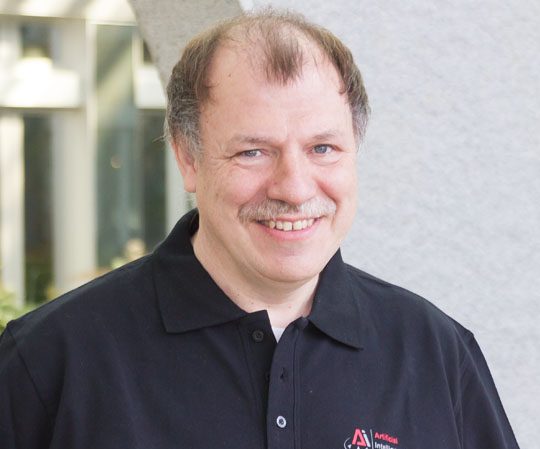
Professor Michael Beetz
Head of the Institute for Artificial Intelligence (IAI)
Faculty for Mathematics & Informatics
University of Bremen, Germany
Knowledge Representation and Reasoning for Cognition-enabled Robot Manipulation
Robotic agents that can accomplish manipulation tasks with the competence of humans have been the holy grail for AI and robotics research for more than 50 years. However, while the fields made huge progress over the years, this ultimate goal is still out of reach. I believe that this is the case because the knowledge representation and reasoning methods that have been proposed in AI so far are necessary but still too abstract. In this talk I propose to endow robots with the capability to mentally “reason with their eyes and hands”, that is to internally emulate and simulate their perception-action loops based on photo-realistic images and faithful physics simulations, which are made machine-understandable by casting them as virtual symbolic knowledge bases. These capabilities allow robots to generate huge collections of machine-understandable manipulation experiences, which they can then generalize into commonsense and intuitive physics knowledge applicable to open manipulation task domains. The combination of learning, representation, and reasoning will equip robots with an understanding of the relation between their motions and the physical effects they cause at an unprecedented level of realism, depth, and breadth, and enable them to master human-scale manipulation tasks. This breakthrough will be achievable by combining simulation and visual rendering technologies with mechanisms to semantically interpret internal simulation data structures and processes.
Biography
Michael Beetz is a professor for Computer Science at the Faculty for Mathematics & Informatics of the University Bremen and head of the Institute for Artificial Intelligence (IAI). He received his diploma degree in Computer Science with distinction from the University of Kaiserslautern. His MSc, MPhil, and PhD degrees were awarded by Yale University in 1993, 1994, and 1996, and his Venia Legendi from the University of Bonn in 2000. In February 2019 he received an Honorary Doctorate from Örebro University. He was vice-coordinator of the German cluster of excellence CoTeSys (Cognition for Technical Systems, 2006–2011), coordinator of the European FP7 integrating project RoboHow (web-enabled and experience-based cognitive robots that learn complex everyday manipulation tasks, 2012-2016), and is the coordinator of the German collaborative research centre EASE (Everyday Activity Science and Engineering, since 2017). His research interests include plan-based control of robotic agents, knowledge processing and representation for robots, integrated robot learning, and cognition-enabled perception.

